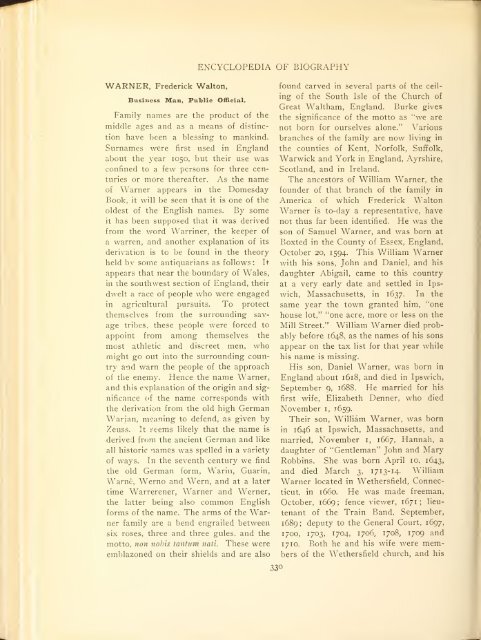Encyclopedia of Connecticut biography, genealogical-memorial ...
Encyclopedia of Connecticut biography, genealogical-memorial ...
Encyclopedia of Connecticut biography, genealogical-memorial ...
You also want an ePaper? Increase the reach of your titles
YUMPU automatically turns print PDFs into web optimized ePapers that Google loves.
WARNER, Frederick Walton,<br />
Business Man, Public Official.<br />
Family names are the product <strong>of</strong> the<br />
middle ages and as a means <strong>of</strong> distinc-<br />
tion have been a blessing to mankind.<br />
Surnames were first used in England<br />
about the year 1050, but their use was<br />
confined to a few persons for three centuries<br />
or more thereafter. As the name<br />
<strong>of</strong> Warner appears in the Domesday<br />
Book, it will be seen that it is one <strong>of</strong> the<br />
oldest <strong>of</strong> the English names. By some<br />
it has been supposed that it was derived<br />
from the word Warriner, the keeper <strong>of</strong><br />
a warren, and another explanation <strong>of</strong> its<br />
derivation is to be found in the theory<br />
held bv some antiquarians as follows: It<br />
appears that near the boundary <strong>of</strong> Wales,<br />
in the southwest section <strong>of</strong> England, their<br />
dwelt a race <strong>of</strong> people who were engaged<br />
in agricultural pursuits. To protect<br />
themselves from the surrounding sav-<br />
age tribes, these people were forced to<br />
appoint from among themselves the<br />
most athletic and discreet men, who<br />
might go out into the surrounding country<br />
and warn the people <strong>of</strong> the approach<br />
<strong>of</strong> the enemy. Hence the name Warner,<br />
and this explanation <strong>of</strong> the origin and sig-<br />
nificance <strong>of</strong> the name corresponds with<br />
the derivation from the old high German<br />
Warjan, meaning to defend, as given by<br />
Zeuss. It seems likely that the name is<br />
derived from the ancient German and like<br />
all historic names was spelled in a variety<br />
<strong>of</strong> ways. In the seventh century we find<br />
the old German form, Warm, Guarin,<br />
Warne, Werno and Wern, and at a later<br />
time Warrerener, Warner and Werner,<br />
the latter being also common English<br />
forms <strong>of</strong> the name. The arms <strong>of</strong> the Warner<br />
family are a bend engrailed between<br />
six roses, three and three gules, and the<br />
motto, non nobis tantum nati. These were<br />
emblazoned on their shields and are also<br />
ENCYCLOPEDIA OF BIOGRAPHY<br />
330<br />
found carved in several parts <strong>of</strong> the ceil-<br />
ing <strong>of</strong> the South Isle <strong>of</strong> the Church <strong>of</strong><br />
Great Waltham, England. Burke gives<br />
the significance <strong>of</strong> the motto as "we are<br />
not born for ourselves alone." Various<br />
branches <strong>of</strong> the family are now living in<br />
the counties <strong>of</strong> Kent, Norfolk, Suffolk,<br />
Warwick and York in England, Ayrshire,<br />
Scotland, and in Ireland.<br />
The ancestors <strong>of</strong> William Warner, the<br />
founder <strong>of</strong> that branch <strong>of</strong> the family in<br />
America <strong>of</strong> which Frederick Walton<br />
Warner is to-day a representative, have<br />
not thus far been identified. He was the<br />
son <strong>of</strong> Samuel Warner, and was born at<br />
Boxted in the County <strong>of</strong> Essex, England,<br />
October 20, 1594. This William Warner<br />
with his sons, John and Daniel, and his<br />
daughter Abigail, came to this country<br />
at a very early date and settled in Ips-<br />
wich, Massachusetts, in 1637. In the<br />
same year the town granted him, "one<br />
house lot," "one acre, more or less on the<br />
Mill Street." William Warner died prob-<br />
ably before 1648, as the names <strong>of</strong> his sons<br />
appear on the tax list for that year while<br />
his name is missing.<br />
His son, Daniel Warner, was born in<br />
England about 1618, and died in Ipswich,<br />
September 9, 1688. He married for his<br />
first wife, Elizabeth Denner, who died<br />
November 1, 1659.<br />
Their son, William Warner, was born<br />
in 1646 at Ipswich, Massachusetts, and<br />
married, November 1, 1667, Hannah, a<br />
daughter <strong>of</strong> "Gentleman" John and Mary<br />
Robbins. She was born April 10, 1643,<br />
and died March 3, 1713-14. William<br />
Warner located in Wethersfield, Connec-<br />
ticut, in 1660. He was made freeman,<br />
October, 1669; fence viewer, 1671 ; lieu-<br />
tenant <strong>of</strong> the Train Band, September,<br />
1689 ; deputy to the General Court, 1697,<br />
1700, 1703, 1704, 1706, 1708, 1709 and<br />
1710. Both he and his wife were mem-<br />
bers <strong>of</strong> the Wethersfield church, and his

















